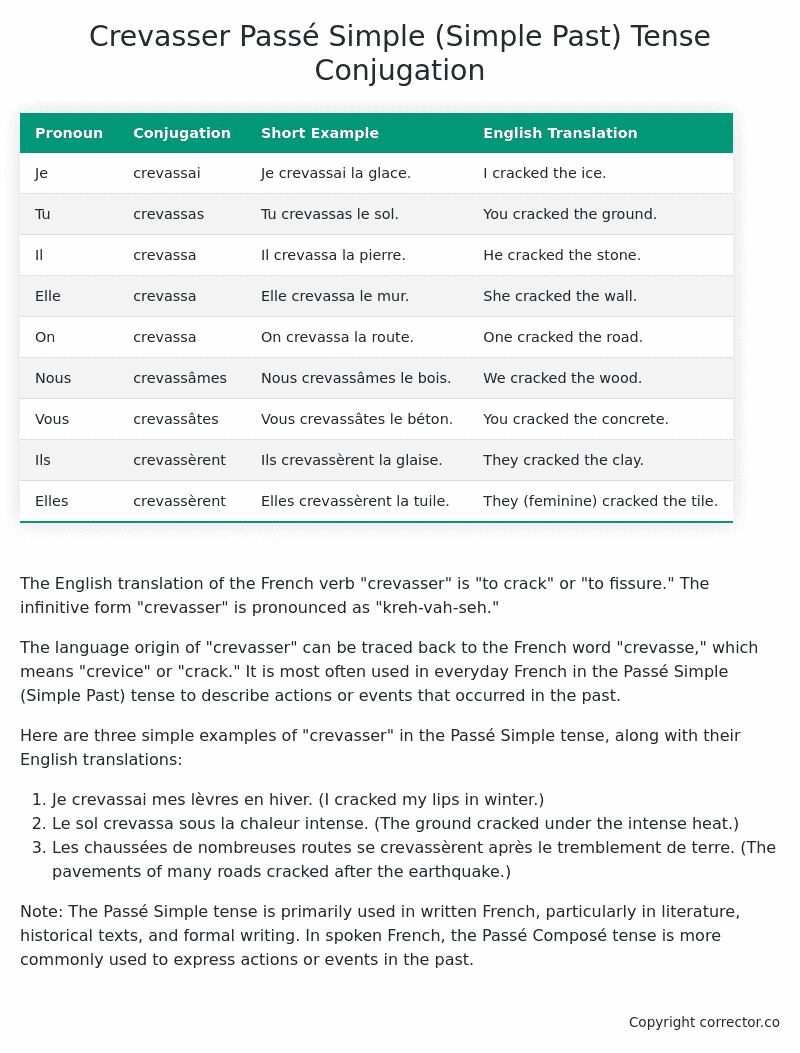Passé Simple (Simple Past) Tense Conjugation of the French Verb crevasser
Introduction to the verb crevasser
The English translation of the French verb “crevasser” is “to crack” or “to fissure.” The infinitive form “crevasser” is pronounced as “kreh-vah-seh.”
The language origin of “crevasser” can be traced back to the French word “crevasse,” which means “crevice” or “crack.” It is most often used in everyday French in the Passé Simple (Simple Past) tense to describe actions or events that occurred in the past.
Here are three simple examples of “crevasser” in the Passé Simple tense, along with their English translations:
- Je crevassai mes lèvres en hiver. (I cracked my lips in winter.)
- Le sol crevassa sous la chaleur intense. (The ground cracked under the intense heat.)
- Les chaussées de nombreuses routes se crevassèrent après le tremblement de terre. (The pavements of many roads cracked after the earthquake.)
Note: The Passé Simple tense is primarily used in written French, particularly in literature, historical texts, and formal writing. In spoken French, the Passé Composé tense is more commonly used to express actions or events in the past.
Table of the Passé Simple (Simple Past) Tense Conjugation of crevasser
| Pronoun | Conjugation | Short Example | English Translation |
|---|---|---|---|
| Je | crevassai | Je crevassai la glace. | I cracked the ice. |
| Tu | crevassas | Tu crevassas le sol. | You cracked the ground. |
| Il | crevassa | Il crevassa la pierre. | He cracked the stone. |
| Elle | crevassa | Elle crevassa le mur. | She cracked the wall. |
| On | crevassa | On crevassa la route. | One cracked the road. |
| Nous | crevassâmes | Nous crevassâmes le bois. | We cracked the wood. |
| Vous | crevassâtes | Vous crevassâtes le béton. | You cracked the concrete. |
| Ils | crevassèrent | Ils crevassèrent la glaise. | They cracked the clay. |
| Elles | crevassèrent | Elles crevassèrent la tuile. | They (feminine) cracked the tile. |
Other Conjugations for Crevasser.
Le Present (Present Tense) Conjugation of the French Verb crevasser
Imparfait (Imperfect) Tense Conjugation of the French Verb crevasser
Passé Simple (Simple Past) Tense Conjugation of the French Verb crevasser (You’re reading it right now!)
Passé Composé (Present Perfect) Tense Conjugation of the French Verb crevasser
Futur Simple (Simple Future) Tense Conjugation of the French Verb crevasser
Futur Proche (Near Future) Tense Conjugation of the French Verb crevasser
Plus-que-parfait (Pluperfect) Tense Conjugation of the French Verb crevasser
Passé Antérieur (Past Anterior) Tense Conjugation of the French Verb crevasser
Futur Antérieur (Future Anterior) Tense Conjugation of the French Verb crevasser
Subjonctif Présent (Subjunctive Present) Tense Conjugation of the French Verb crevasser
Subjonctif Passé (Subjunctive Past) Tense Conjugation of the French Verb crevasser
Subjonctif Imparfait (Subjunctive Imperfect) Tense Conjugation of the French Verb crevasser
Subjonctif Plus-que-parfait (Subjunctive Pluperfect) Tense Conjugation of the French Verb crevasser
Conditionnel Présent (Conditional Present) Tense Conjugation of the French Verb crevasser
Conditionnel Passé (Conditional Past) Tense Conjugation of the French Verb crevasser
Conditionnel Passé II (Conditional Past II) Tense Conjugation of the French Verb crevasser
L’impératif Présent (Imperative Present) Tense Conjugation of the French Verb crevasser
L’impératif Passé (Imperative Past) Tense Conjugation of the French Verb crevasser
L’infinitif Présent (Infinitive Present) Tense Conjugation of the French Verb crevasser
L’infinitif Passé (Infinitive Past) Tense Conjugation of the French Verb crevasser
Le Participe Présent (Present Participle) Tense Conjugation of the French Verb crevasser
Le Participe Passé (Past Participle) Tense Conjugation of the French Verb crevasser
Struggling with French verbs or the language in general? Why not use our free French Grammar Checker – no registration required!
Get a FREE Download Study Sheet of this Conjugation 🔥
Simply right click the image below, click “save image” and get your free reference for the crevasser Passé Simple tense conjugation!

Crevasser – About the French Passé Simple (Simple Past) Tense
Formation
Usage
Narration
Historical Context
Interactions with other tenses
Passé Composé
Imparfait
Conditional and Subjunctive
Summary
I hope you enjoyed this article on the verb crevasser. Still in a learning mood? Check out another TOTALLY random French verb conjugation!


